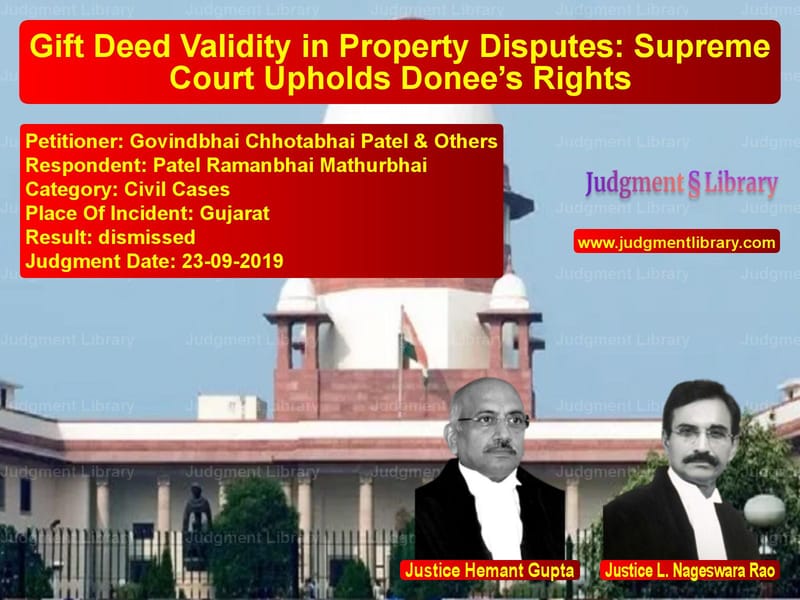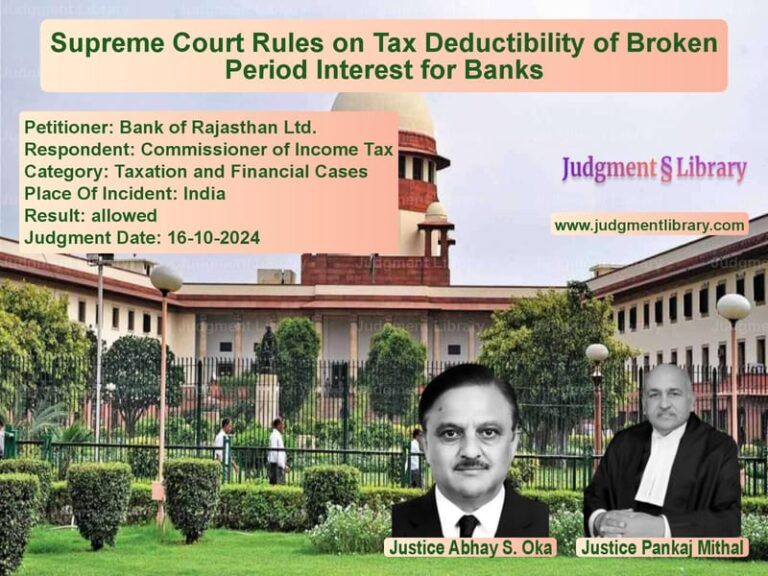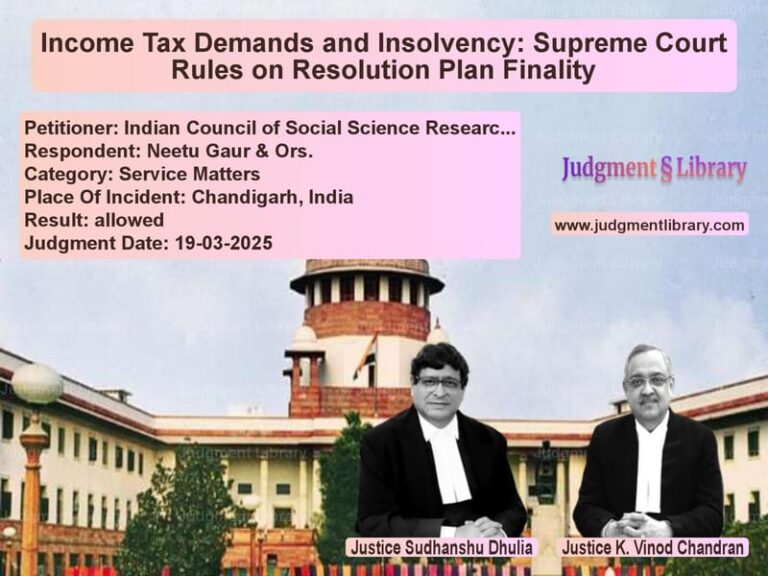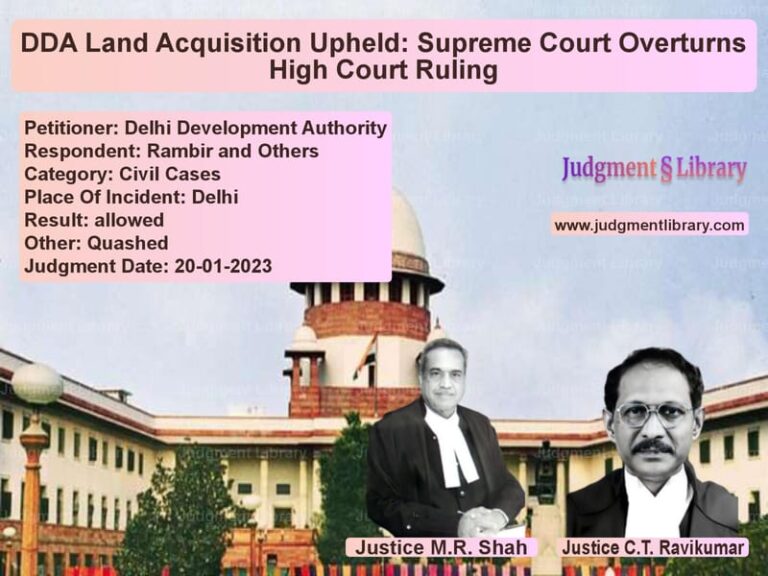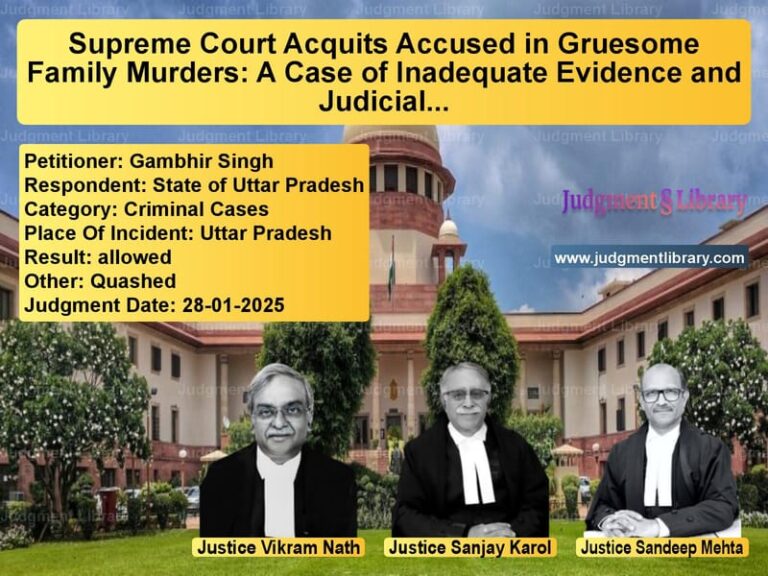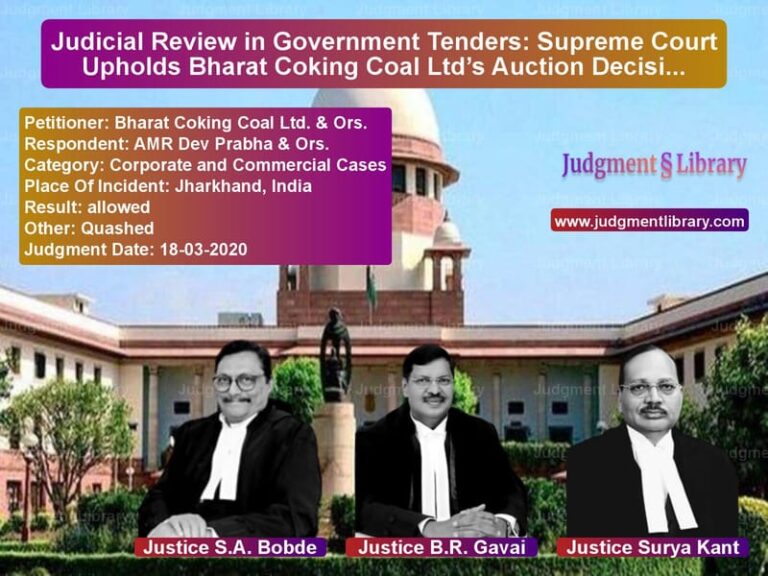Gift Deed Validity in Property Disputes: Supreme Court Upholds Donee’s Rights
The case of Govindbhai Chhotabhai Patel & Others v. Patel Ramanbhai Mathurbhai revolves around a property dispute arising from the validity of a gift deed executed in favor of the respondent. The appellants, legal heirs of the deceased property owner, challenged the deed’s legality, arguing that the property was ancestral and could not have been transferred unilaterally. The Supreme Court examined the applicability of the Hindu Succession Act and the Indian Evidence Act in determining whether the property was self-acquired or ancestral.
Background of the Case
The dispute arose over a property that the appellants claimed was ancestral in nature. Their father, Chhotabhai Ashabhai Patel, executed a registered gift deed on November 15, 1977, in favor of the respondent, Patel Ramanbhai Mathurbhai. The appellants contested the validity of this deed, asserting that:
- The property was ancestral, and their father had no legal authority to gift it away without their consent.
- The gift deed was fraudulent and fabricated.
- The donee had no legitimate right to the property.
The trial court ruled in favor of the appellants, holding that the property was ancestral and that the gift deed was not legally valid. The first appellate court upheld this decision. However, the Gujarat High Court reversed these findings, ruling that the property was self-acquired and that the donor had the legal right to execute the gift deed.
Petitioners’ (Appellants’) Arguments
The appellants contended that:
- The disputed property was ancestral as it had been inherited by their father from their grandfather.
- Under Hindu law, ancestral property cannot be transferred unilaterally by a single heir.
- The donor had no legal capacity to execute the gift deed.
- The gift deed was fraudulent and executed under undue influence.
Respondents’ (Donee’s) Arguments
The respondent countered that:
- The property was self-acquired by the donor’s father and was bequeathed to the donor through a will.
- Since the property was inherited through a testamentary disposition, it was not ancestral but self-acquired.
- The gift deed was legally valid, as the donor had full ownership rights over the property.
- The appellants’ challenge was baseless and motivated by ulterior motives.
Supreme Court’s Observations and Judgment
The Supreme Court analyzed the distinction between ancestral and self-acquired property under Hindu law. Referring to precedents such as C.N. Arunachala Mudaliar v. C.A. Muruganatha Mudaliar and Shyam Narayan Prasad v. Krishna Prasad, the Court noted:
“The property inherited from a grandfather through a will does not automatically become ancestral in nature. A self-acquired property in the hands of the testator does not become coparcenary property simply by virtue of inheritance.”
The Court further ruled that:
- The property was originally self-acquired by the donor’s father and was passed on through a will.
- The appellants failed to provide evidence that the property was treated as ancestral.
- Under the Hindu Succession Act, self-acquired property devolves upon heirs individually and does not become coparcenary property.
- The donor had full ownership rights and was legally entitled to execute the gift deed.
On the issue of whether the gift deed was fraudulent, the Court observed:
“A gift deed, once registered, carries a presumption of validity. The burden to prove fraud or forgery lies upon the challenger. In the present case, the appellants have failed to provide substantive evidence to establish their claims.”
Regarding the applicability of Section 68 of the Indian Evidence Act, the Court clarified:
“When a registered document is not specifically denied, the need for examining attesting witnesses does not arise. The appellants failed to specifically deny execution, and thus, the gift deed stands proved.”
Accordingly, the Supreme Court upheld the High Court’s decision and dismissed the appeal.
Key Takeaways from the Judgment
- Distinction Between Ancestral and Self-Acquired Property: The judgment clarifies that property inherited through a will remains self-acquired and does not automatically acquire ancestral status.
- Legal Authority to Gift Property: A property owner has full authority to transfer self-acquired property through a gift deed without requiring the consent of legal heirs.
- Presumption of Validity for Registered Documents: Once a document is duly registered, it is presumed to be valid unless proven otherwise.
- Burden of Proof on the Challenger: The onus to prove fraud or forgery in a registered document lies with the person challenging its validity.
Impact of the Judgment
- Precedent for Future Property Disputes: The ruling provides clarity on property inheritance laws and the validity of gift deeds.
- Strengthening Property Rights: The judgment reinforces the rights of property owners to freely dispose of their self-acquired property.
- Guidance for Lower Courts: The decision sets clear parameters for assessing claims of fraud in property transfers.
Conclusion
The Supreme Court’s ruling in this case is a landmark decision clarifying the legal status of inherited property and the rights of donors under Hindu law. By upholding the validity of the gift deed, the Court has reinforced the principle that self-acquired property can be freely transferred. This judgment serves as a crucial precedent for future property disputes in India.
Petitioner Name: Govindbhai Chhotabhai Patel & Others.Respondent Name: Patel Ramanbhai Mathurbhai.Judgment By: Justice Hemant Gupta, Justice L. Nageswara Rao.Place Of Incident: Gujarat.Judgment Date: 23-09-2019.
Don’t miss out on the full details! Download the complete judgment in PDF format below and gain valuable insights instantly!
Download Judgment: Govindbhai Chhotabha vs Patel Ramanbhai Math Supreme Court of India Judgment Dated 23-09-2019.pdf
Direct Downlaod Judgment: Direct downlaod this Judgment
See all petitions in Property Disputes
See all petitions in Succession and Wills
See all petitions in Contract Disputes
See all petitions in Judgment by Hemant Gupta
See all petitions in Judgment by L. Nageswara Rao
See all petitions in dismissed
See all petitions in supreme court of India judgments September 2019
See all petitions in 2019 judgments
See all posts in Civil Cases Category
See all allowed petitions in Civil Cases Category
See all Dismissed petitions in Civil Cases Category
See all partially allowed petitions in Civil Cases Category

